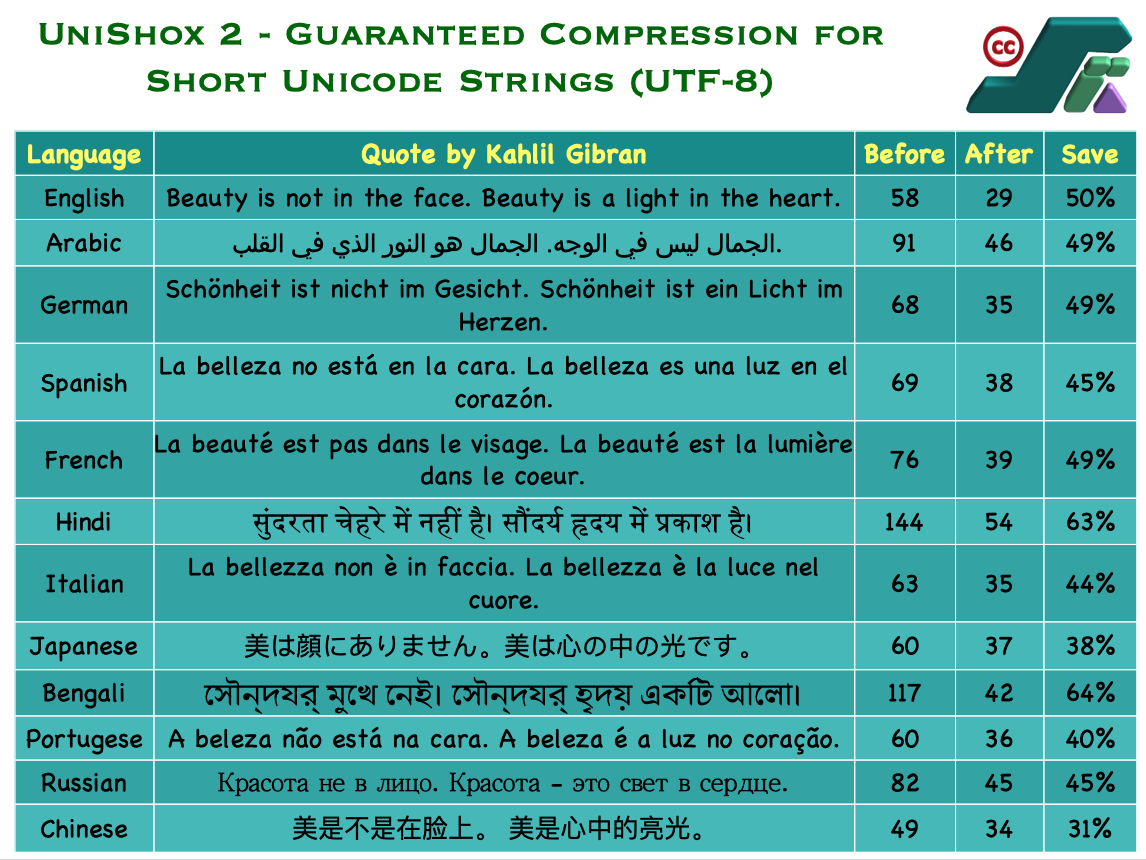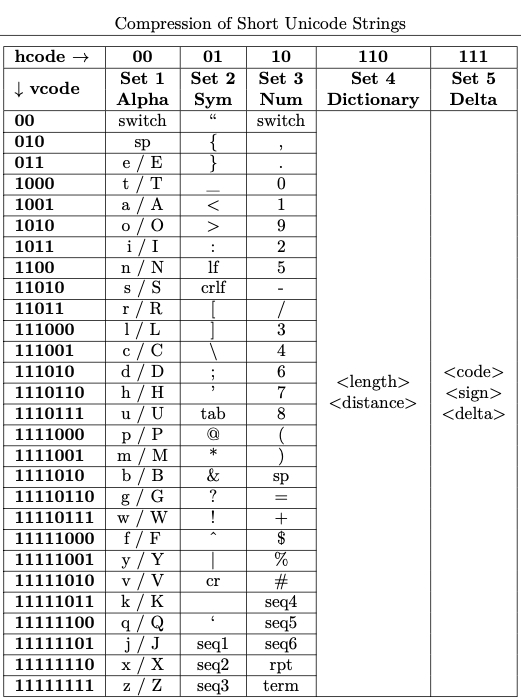Unishox2
 Unishox2 copied to clipboard
Unishox2 copied to clipboard
Compression for Unicode short strings (works on arduino)
Unishox: A hybrid encoder for Short Unicode Strings
In general compression utilities such as zip, gzip do not compress short strings well and often expand them. They also use lots of memory which makes them unusable in constrained environments like Arduino. So Unishox algorithm was developed for individually compressing (and decompressing) short strings.
Note: The present byte-code version is 2 and it replaces Unishox 1. Unishox 1 is still available as unishox1.c, but it will have to be compiled manually if it is needed.
This is a C/C++ library. See here for CPython version and here for Javascript version which is interoperable with this library.
Applications
- Compression for low memory devices such as Arduino and ESP8266
- Compression of Chat application text exchange include Emojis
- Storing compressed text in database
- Faster retrieval speed when used as join keys
- Bandwidth and storage cost reduction for Cloud

How it works
Unishox is an hybrid encoder (entropy, dictionary and delta coding). It works by assigning fixed prefix-free codes for each letter in the above Character Set (entropy coding). It also encodes repeating letter sets separately (dictionary coding). For Unicode characters, delta coding is used.
The model used for arriving at the prefix-free code is shown below:

The complete specification can be found in this article: A hybrid encoder for compressing Short Unicode Strings. This can also be found at figshare here with DOI 10.6084/m9.figshare.17056334.v2.
Compiling
To compile, just use make or use gcc as follows:
gcc -std=c99 -o unishox2 test_unishox2.c unishox2.c
Unit tests (automated)
For testing the compiled program, use:
./test_unishox2 -t
This invokes run_unit_tests() function of test_unishox2.c, which tests all the features of Unishox2, including edge cases, using 159 strings covering several languages, emojis and binary data.
Further, the CI pipeline at .github/workflows/c-cpp.yml runs these tests for all presets and also tests file compression for the different types of files in sample_texts folder. This happens whenever a commit is made to the repository.
API
int unishox2_compress_simple(const char *in, int len, char *out);
int unishox2_decompress_simple(const char *in, int len, char *out);
Usage
To see Unishox in action, simply try to compress a string:
./test_unishox2 "Hello World"
To compress and decompress a file, use:
./test_unishox2 -c <input_file> <compressed_file>
./test_unishox2 -d <compressed_file> <decompressed_file>
Note: Unishox is good for text content upto few kilobytes. Unishox does not give good ratios compressing large files or compressing binary files.
Character Set
Unishox supports the entire Unicode character set. As of now it supports UTF-8 as input and output encoding.
Interoperability with the JS Library
Strings that were compressed with this library can be decompressed with the JS Library and vice-versa. However please see this section in the documentation for usage.
Projects that use Unishox
- Unishox Compression Library for Arduino Progmem
- Sqlite3 User Defined Function as loadable extension
- Sqlite3 Library for ESP32
- Sqlite3 Library for ESP8266
- Port of Unishox 1 to Python and C++ by Stephan Hadinger for Tasmota
- Python bindings for Unishox2
- Unishox2 Javascript library
- Unishox2 proposed to be used in Meshtastic project
Credits
- Thanks to Jonathan Greenblatt for his port of Unishox2 that works on Particle Photon
- Thanks to Chris Partridge for his port of Unishox2 to CPython and his comprehensive tests using Hypothesis and extensive performance tests
- Thanks to Stephan Hadinger for his port of Unishox1 to Python for Tasmota
- Thanks to Luis Díaz Más for his PRs to support MSVC and CMake setup
- Thanks to James Z.M. Gao for his PRs on improving presets, unit tests, bug fixes and more
- Thanks to Jm Casler and Shiv Kokroo for choosing and integrating Unishox into Meshtastic project
Sponsor
If you like this work, you could buy me coffee. However don't get pressured by this. Feel free to use this work as you like.
Issues
In case of any issues, please email the Author (Arundale Ramanathan) at [email protected] or create GitHub issue.

